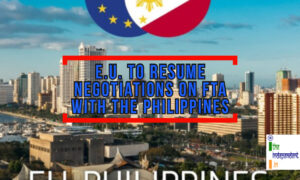
The European Commission defined how the block can meet their goal of reducing the greenhouse gas emissions to “net zero” by 2050.
The European Union (E.U.) today, i.e., Wednesday, July 14, 2021, unveiled an ambitious 10-step programme, “Fit for 55” to tackle climate change, aiming to become carbon neutral by 2050.
The European Commission, the executive body of the E.U., defined how the 27 Member States can meet their collective goal of reducing the net greenhouse gas emissions by 55% from 1990 levels by 2030 and further to “net zero” emissions by 2050.
The proposal includes measures like tax on jet fuel and effective ban on the sale of petrol and diesel powered cars within 20 years.
Speaking on the occasion, the President of European Commission – Ursula von der Leyen said, “By acting now we can do things another way… and choose a better, healthier and more prosperous way for the future.”
She further said, “It is our generational task… [to secure] the wellbeing of not only our generation, but of our children and grandchildren. Europe is ready to lead the way.”
Ursula tweeted,
We can choose a better, healthier, more prosperous way of living.
— Ursula von der Leyen (@vonderleyen) July 14, 2021
Saving the climate is our generational task. It must unite & encourage us.
It is about securing the wellbeing and freedom of our children. There is no greater, nobler task.
Europe is ready to lead the way. pic.twitter.com/jFqkSQyjRh
She further tweeted,
The #EUGreenDeal is our growth model, powered by innovation, clean energy & circular economy
— Ursula von der Leyen (@vonderleyen) July 14, 2021
The Climate Law makes our climate targets legal obligations
Now Europe is the 1st continent to present a comprehensive architecture to meet our climate ambitions https://t.co/1dX4mYXueW
As a part of the plan, tariffs will be placed on certain goods produced outside the bloc, depending on their carbon footprint, subjecting them to the same standards that already exist for good produced within the E.U. The plan is to discourage E.U. companies from importing cheaper materials from places where environmental standards are lower. In the initial implementation, the sectors affected would include cement, iron and steel, aluminium, fertilizer and electricity.
Petrol and gasoline fuels will see their minimum tax rate increased by significant margins, rising from € 359 and € 330, respectively, to € 443 and € 482 per thousand litres by 2033, while fuels like kerosene, for which the EU sets no minimum rate, will be charged € 468 per thousand litres.
Another key highlight is lowering of the cap in the E.U. Emissions Trading System (ETS), the world’s first and largest carbon market. Created in 2005, the ETS works by placing a cap on the carbon emissions companies within the EU are allowed to produce each year. If a company goes over that limit, they are fined. Cars with combustion engines will not be produced within the bloc from 2035. Financial incentives will be offered to countries that replace traditional fuel with a sustainable alternative in aviation and maritime transportation.
These measures would cost € 500 billion at the Europe level alone. These are likely to push up household heating bills and cost of flights in the E.U. Financial assistance will be available for people to install insulation and make other long-term changes to their homes.







